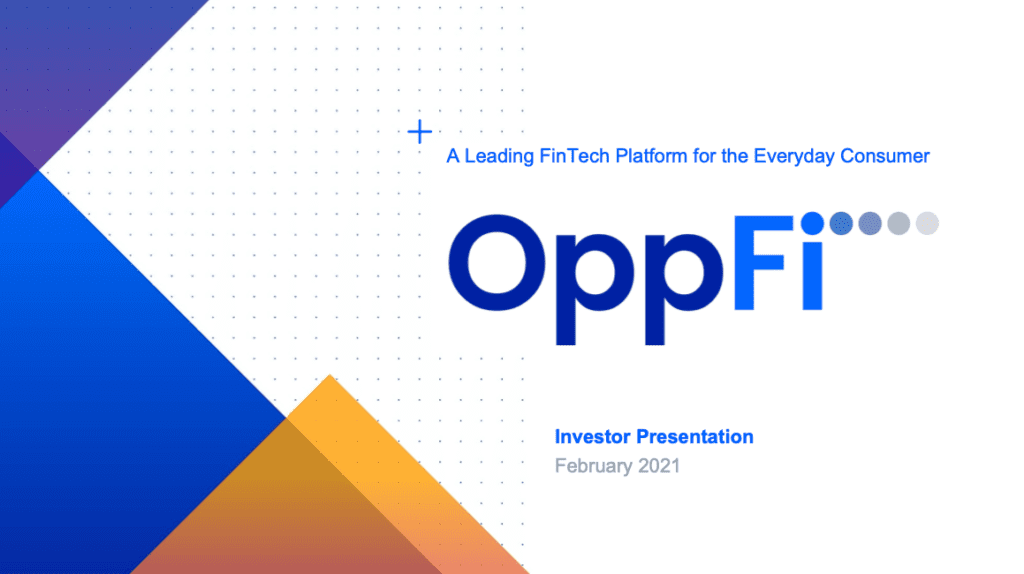The fintech SPAC craze continues with two big fintech names announcing deals last week. MoneyLion and OppLoans (they are rebranding to OppFi) are both going public via SPACs with the deals expected to close by the end of Q2.
I caught up with the CEOs of both companies today to get the back story on their SPAC deals. But before I get into those conversations a little primer on SPACs. SPAC stands for Special Purpose Acquisition Vehicle, these are public companies formed for the explicit purpose to acquire an existing company. They have been around for decades but have seen a resurgence in the last few months. We are keeping track of all the SPAC deals in fintech here.
MoneyLion Closes Deal With Fusion Acquisition Corp
Founded in 2013 MoneyLion began life as an online consumer lending platform. But CEO and founder Dee Choubey always saw that as just an entry point into offering a much broader suite of financial services. But even as a lender they had a different approach, offering a free PFM app to help their customers make better financial decisions. Back in 2016 (when I recorded this podcast interview with Dee) customers could connect bank or credit card accounts and receive insights into how to save money or build a better financial life.
That initial loan product has gone now as MoneyLion has morphed into a full-service financial app or as they call it the “All-in-one Mobile Banking Experince”. They offer mobile banking, instant cash advances, investment accounts, credit builder loans, debit rewards cards and more.
When I asked Dee why he decided to take the company public now he talked about the higher profile a public company has and the enhanced ability to raise capital. They would not have been able raise this much capital from the private markets so doing a SPAC deal was the most efficient way to go.
Speaking of the deal, here are some of the details that were shared in the investor presentation. MoneyLion will merge with Fusion Acquisiton Corp (ticker: FUSE) in a $2.9 billion deal. Fusion is chaired by Jim Ross, a former senior executive at State Street Global Advisors, and they IPO’d in June 2020 looking to acquire a fintech company with an enterprise value under $3 billion. Ron Suber introduced the MoneyLion team to Fusion and advised on the transaction.
The deal has an implied transaction value of $2.4 billion and MoneyLion will receive $526 million in net proceeds. This will allow them to accelerate development of a number of new products including a buy now pay later offering, a secured credit card and a crypto trading and rewards platform.
They made the decision a few years ago to move away from the lending business and focus on building out their technology platform. What they are best at is building software by ingesting huge amounts of data. They still have a lending product, Credit Builder, for loans up to $1,000 over a maximum of 12 months, that is used by around 20% of their customers. Most will graduate from that product after six to nine months.
Dee said that MoneyLion is not interested in becoming a bank. They like the “balance sheet light” approach so they can grow rapidly and keep building new and better products. They like providing a digital wallet and focusing on the technology. They will do everything a bank might do without the balance sheet part.
On to the numbers for MoneyLion. They generated adjusted revenue at a $102 million annual run rate in Q4 2020 which was 197% growth over Q4 2019. Their annualized Q4 2020 loss was $26 million and they ended the year with 1.4 million users. They are anticipating a compound annual growth rate (CAGR) in revenue of 77%.
OppLoans Merges With FG New America Acquisition Corp and Rebrands to OppFi
OppLoans is not your typical fintech company. For one, they have never raised any outside equity funding. They were initially funded by the Schwartz family in Chicago and have been profitable now for many years. That in itself sets them apart (for an in-depth perspective listen to my interview with Jared Kaplan, CEO of OppLoans, from last November).
So, deciding to go public was not really about raising capital. In my conversation with Jared he said that the move was more about having a larger megaphone. Because they have not gone down the well-worn path of multiple venture capital rounds, they have a lower profile than most of their contemporaries. He liked the SPAC route because it is more efficient and not as distracting as an IPO.
OppLoans announced their SPAC merger last week (see the investor presentation here). They will be merging with FG New America Corp (ticker: FGNA) which is run by Joe Moglia, the former CEO and Chairman of TD Ameritrade. At the same time they rebranded the company to OppFi, so I will refer to the company of OppFi for the remainder of this article.
The transaction implies an equity valuation at closing of around $800 million and will be fully funded through cash in the trust. When you dig into the financials you will see that the multiples here are quite different to other deals. This represents a 12.2x multiple on 2021 adjusted net income or just 6.9x of 2021 adjusted EBITDA.
OppFi is an online installment lender that has facilitated over 1.5 million loans with a total origination volume of over $2.3 billion, which works out as an average loan size of around $1,500. They have a five-year revenue CAGR of over 100% and have been profitable for many years with a 2020 estimated adjusted EBITDA of $99 million on revenue of $323 million.
OppFi began life as a direct lender with multiple state lending licenses. They moved to a bank partnership model a couple of years ago and are now fully committed to that model. They have multiple bank partners today and will continue with this model as they release new products.
Speaking of new products they just announced SalaryTap which is an innovative new salary advance feature made possible by the advances in real-time payroll verification. These are similar sized loans to their core product, up to $2,000, but loan repayments come from a payroll deduction. This means that the interest rates are significantly lower, averaging around 30% APR. They are building pipes into payroll systems directly within their app for a seamless user experience.
Also coming in 2021 is the OppFi credit card. This will be a graduation product for OppFi customers and will allow them to expand their customer base. This will also give them a potential foray into point of sale lending.
When I asked Jared about the rebrand to OppFi he said that see their role as providing far more than loans. They want to be the digital financial services destination for the everyday consumer. This means multiple products and the flexibility to go into other areas of finance beyond loans but with a focus on improving the financial health of everyday consumers.
Learn From the SPAC Experts
Last week on LendIt Fintech Digital we hosted two leading fintech SPAC experts: Brendan Carroll of Victory Park Capital and Greg Smith of FT Partners. Both have been a part of many SPAC deals and their insights were very informative. It was a lively session and you can check out the recording here.





